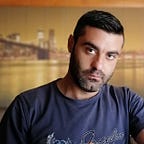Leonid Agutin. From a barefoot boy to the Master of the Russian stage. (Part I)
I have almost agoraphobia — I don’t like it when a lot of people gather in one place. It’s not a very useful quality for my profession. Big parties, events, the whole show business — it has always been the most difficult thing for me, something I was very afraid of, shy about, and didn’t like.
His music is recognizable from the first notes. Over his long creative career spanning more than three decades, he has established himself as a versatile maestro, seamlessly blending different genres and forms to create his unique musical style. His pleasant tone can penetrate the listener’s soul and evoke a wide range of emotions and feelings — from joy and delight to sadness and nostalgia. Regardless of the genre in which he performs his works, his tenor always sounds sincere and genuine, making the audience empathize with every word and note.
My poems are my worldview, my creed, and my life stance… I believe that genuinely and spontaneously written lines can make people listen, laugh, or cry.
Leonid Agutin is a Russian composer, poet, singer, and musician. He was born on July 16, 1968, in Moscow and grew up in a creative family. His father, Nikolay Petrovich, was a member of the VIA “Golubye Gitary” (Blue Guitars) and is a laureate of the “Bratislavskaya Lira” competition. Like father, like son… He also worked as an administrator for groups like Stas Namin, “Vesyolye Rebyata” (Happy Guys), “Poyushchie Serdtsa” (Singing Hearts), and “Pesnyary,” and currently he is engaged in music criticism. His mother, Lyudmila Leonidovna, was involved in dancing in her youth and worked as a primary school teacher, holding the title of Honored Teacher of the Russian Federation. At the age of six, the boy was sent to a music school, where his talents first emerged, and then there was a Moscow jazz school, specializing in piano, at the “Moscow River” Culture House.
I was listening to my favorite El Djerro and thinking, “It would be great to combine something that people can relate to, interesting live instruments, and have a cultural aspect to it, so that an atmosphere would immediately be created — as if street musicians were sitting in a square and playing brilliantly. That’s the kind of mood.” Gradually, I found my style: I recorded “Barefoot Boy,” and I was simply amazed at how everything came together.
The artist’s creative path began in 1989, precisely at the end of the 80s when Leonid started touring the former Soviet republics as part of various groups as a “warm-up” artist. At the same time, he worked as a composer and arranger in Moscow studios and started collaborating with the songwriter German Vitke. Soon, Agutin started receiving invitations to television shows. In 1990, the musician participated in the program “Shire Krug,” where he performed the song “Padayet Sneg” (Snow Is Falling), and his wide popularity came in 1991 after he took part in popular TV shows of that time, such as “50 na 50” with the song “Ty Menya Okoldovala” (You Enchanted Me) and “Marafon 15” with the composition “A Ya Malenkiy” (And I’m Small). In the same year, Agutin recorded his first hit, “Barefoot Boy,” while working at the Salam studio in Tver. Recalling that time, the musician will say:
“I had a girlfriend at the institute — Svetlana, a wonderful person, very intelligent and talented. She used to tell me, “When you go on stage, you have this look as if a physics student is about to sing pop music.” And at that time, I had a short haircut after my military service. So Svetlana said, “You need to do something with yourself, grow your hair, come up with some kind of hairstyle. Singing and playing the piano, it’s not very stage-worthy. It would be better if you pick up a guitar.” Those darn hair took a long time to grow; it was a hellish period. At first, I looked like Bonifaciy, and then the curls started hanging down a bit. I started portraying some mafioso, slicking my hair back with gel, and experimented a lot until I found this hippie style. And then everything came together. The music, the element, the appearance.
In 1992, Leonid Agutin became a laureate of the international competition for young pop singers “Yalta-1992,” where he performed two songs that became absolute hits: “Barefoot Boy” and “Who Told You?” A year later, he received an award at the International Contest of Young Pop Performers “Jurmala-1993.” In 1994, his first solo album titled “Barefoot Boy” was released, bringing him immense popularity and victories in three categories at various music awards for the songs “Hop Hey, La La Ley” and “The Voice of Tall Grass.” Just a year later, the artist held two sold-out concerts at the Olympic Sports Complex and released his second solo album titled “Decameron,” which became one of the record holders in terms of receiving the “Golden Gramophone” award and sales on physical media. Reflecting on his success, creativity, and money, during this period, the artist said:
“It’s difficult to compare money and creativity. When you’re developing, when you start directly encountering the achievements of civilization, you begin to gain something, and at the same time, you lose some kind of spirit… I’ll tell you how I get out of this situation: I’m basically indifferent to wealth. Although I really want a big beautiful house that will have everything, my entire life. Somewhere by the shore, undoubtedly. But the thing is, I want to have a home, not the money that this house costs.”
